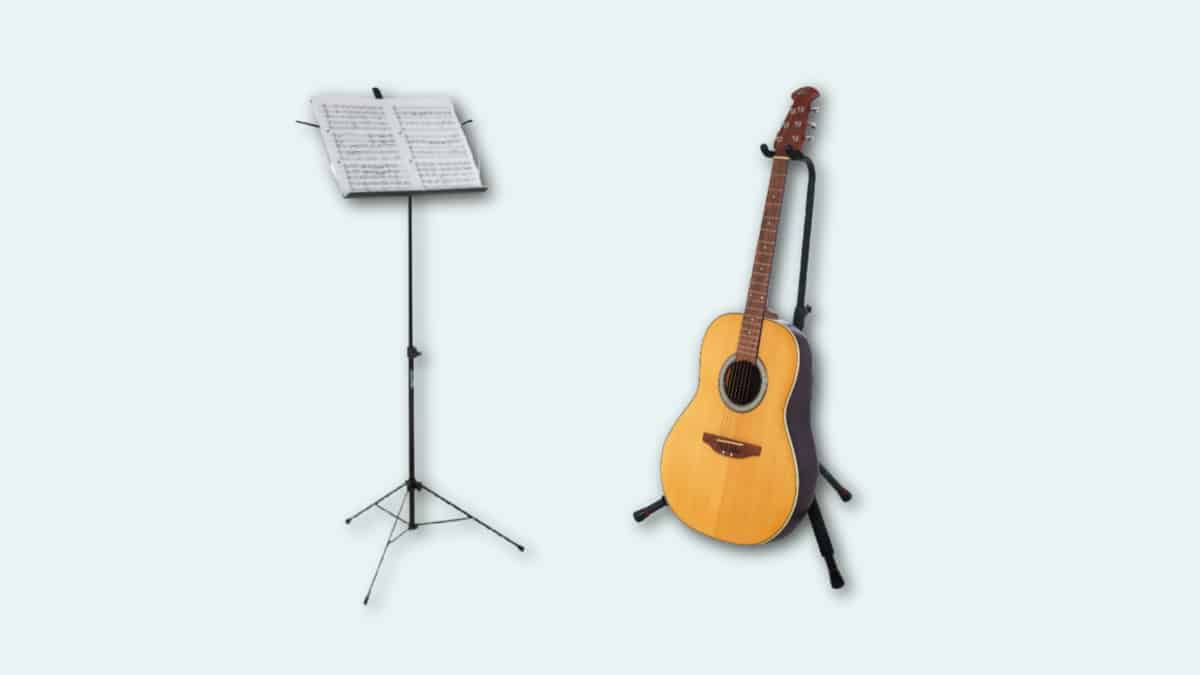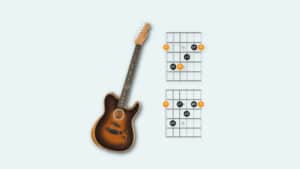Should I take guitar lessons, or can I teach myself?
Taking guitar lessons is highly recommended to beginners who need extra help learning guitar basics like finger placement, basic chords, the right techniques, and getting valuable feedback from a professional guitar teacher. However, if you feel you want to learn the guitar at your own pace, freely choosing what you want to learn, you can always teach yourself from a variety of self-taught resources that are frequently free or very low in cost.
Jimi Hendrix. Eric Clapton. Eddie Van Halen.
Besides all being prodigious guitar talents, they also all have this one thing in common.
They’re all self-taught.
So, should you take guitar lessons or can you teach yourself just like these masters did?
Deciding between these two options is understandably hard.
On the one hand, guitar lessons can be costly. On the other, teaching yourself seems like a risky move.
So which option is better?
Are guitar lessons worth it?
Does teaching yourself work out great?
Let’s find out.
What Is the Best Way to Learn Guitar?
From the moment you get your brand-new guitar, soaking in the joy of finally getting started on your guitar journey, the next thought that is likely to enter your mind is what is the best way to progress from beginner to pro.
How to Learn Guitar
There are two main ways you can learn guitar.
Guitar Lessons
You could take guitar lessons where you sign up for regular one-on-one or group sessions with a guitar instructor. These sessions are usually either conducted in person or online via video call.
Traditionally, most beginners take this route of meeting on a regular basis with a guitar professional.
A guitar professional usually has years of experience training students on how to play the guitar. If they’re good, they’ll deliver well-planned lessons focused on instruction and exercise.
They’ll also give you homework so you keep track of your learning journey and stay motivated in your free time.
Teaching Yourself
Things are much different now. You’ll find many beginners choosing to learn the guitar at their own pace, using a variety of resources.
From signing up for an online course to subscribing to a YouTube channel to downloading a guitar-learning app like Fender, these days there are lots of flexible ways to learn the guitar.
What’s more? Youtube tutorials are free and more in-depth now, with complete lessons for beginners to advanced players.
You only need to go on YouTube and browse for “how to learn guitar,” which will pull up many resources to choose from.
Guitar Lessons vs Teaching Yourself
Both guitar lessons and teaching yourself are valid ways to learn guitar. Which one you choose depends largely on your individual needs.
These are some of the most important factors for you to consider.
Cost
Guitar lessons are more expensive compared to teaching yourself. To take guitar lessons, you’ll need to pay a tuition fee. This often varies depending on the location, mode of instruction, the skill level of the teacher, and the number of lessons you take.
So, the closer you are to a city, the more expensive the tuition fee will be. And if you choose to take your lessons one-on-one, it will cost more than taking your lessons in a group or online.
That said, taking lessons in a more prestigious college with a strong music scene could mean getting more value for your money.
And once you’re comfortable with the basics and have learned the correct technique, you can always switch to self-teaching.
Teaching yourself is cheaper. It could cost nothing or very little money. You only need to research which resource you prefer best, whether it’s a “how to learn guitar” method book, video lessons on YouTube, or signing up for an online course.
While watching a YouTube tutorial is free (only needing an internet connection), an online course may charge a small subscription fee.
Schedule
Are you flexible to attend a scheduled appointment with a guitar teacher on a regular basis or do you want to learn the guitar at your own pace?
Guitar lessons are rigid in their schedule. However, when teaching yourself, you’re free to choose what times you’d like to practice. Plus, it means anyone can start learning the guitar whenever they’d like to.
Motivation
As exciting as picking up your guitar may be in the beginning, it’s easy to lose motivation over time. That’s because learning to play the guitar requires a lot of practice and discipline. You’ll need to put in fifteen minutes to an hour per day to start seeing some progress.
Can you speak to your own experience learning? Add engagement by talking firsthand about your own experience learning the guitar…
Having a guitar teacher by your side is great to keep you going. They’ll motivate you, encourage you, and give you feedback so you get better.
Additionally, having set appointments can help push you to pick up your guitar more often. And the more you practice, the better your guitar-playing skills will be.
Feedback
Hand-in-hand with extra motivation is feedback. The first steps you take when learning the guitar are crucial. It’s easy to fall into an unending trial-and-error beatdown when your guitar doesn’t sound right.
It’s also more likely you’ll learn the wrong techniques while teaching yourself. you may be reading from a method book but won’t actually see the right way to apply it. Or, you may be faithfully following a tutorial but won’t be sure that you’re learning the right thing.
While method books offer valuable information, it’s good to use them as a supplementary resource to a live demonstration such as an online video. And before settling on an online video tutorial, it’s good to do research about the tutor’s credentials and expertise so you’re learning the right thing.
But even with plenty of research, teaching yourself still lacks one core value as a beginner: feedback. There is no surer way to know you’re on the right track or receive instant guidance on why your guitar doesn’t sound right than from a guitar teacher.
A guitar teacher will help show you how to play, pointing out what to do when something goes wrong and how to get the right sound. They’ll go a step further to curate tailored exercises for you to practice songs on your skill level and make improvements where they see fit.
Are Online Guitar Lessons Worth It?
If you’ve decided to go the guitar lessons route, the next decision to make is whether to take the lessons online or offline. The difference between the two is making the trip to the guitar lesson on a regular basis to meet your instructor face-to-face or joining a video call with them right from home.
While the offline way means your instructor is ever-present, paying close attention to your every move and giving feedback on how to move forward, the online way is also pretty effective with video calling tools like Skype or Zoom growing more popular by the day.
Alternatively, you may sign up for an online guitar lessons course, paying a small subscription fee. These provide very detailed and easy to follow along videos that guide you through a structured content format.
You can always come back to watch the videos at your own pace for a cheaper price. The only two things you might miss out on are the motivation a personal guitar teacher will give you, plus the feedback you get when you’re doing it wrong (if you take an online course).
Otherwise, yes. Online guitar lessons are worth it because they are an effective, efficient, and successful way to learn guitar.
How Much are Guitar Lessons?
The cost of guitar lessons often varies per the location, mode of instruction, level of the teacher, and the number of lessons you take. However, on average, you can expect to pay anywhere between $30 – $120 per hour, with most lessons taking 30 – 60 minutes.
Most guitar teachers will offer discount prices for package deals. Also, online guitar lessons are often cheaper, usually going for $30 per hour or less. So be sure to research different deals, the experience and skill level of the teacher, and the school community before paying for guitar lessons.
What Do Beginner Guitar Lessons Include?
With a guitar teacher, they’ll usually bring a ready structured syllabus curated from their past experience in teaching.
This will often include the basics with lots of practice to grasp the content. Among the first topics you can expect include:
- Parts of the guitar
- How to hold the guitar
- How to tune the guitar
- How to play basic chords
- How to pick and strum properly
- Basic music theory
Don’t worry if your fingers get sore on the first few tries. With time, it gets better, and it’s also why learning and practicing the basics is important.
For future lessons, you’ll get deeper into learning chords, notes, and scales, and even get to play your first song.
Where to Find Guitar Lessons
Finding a great guitar teacher isn’t easy. You’ll need to take the time to research the right fit for you. To get you started, here are some tips to consider:
Ask for Recommendations
The easiest way to find a great guitar teacher is to ask for recommendations from guitar players you already know. Alternatively, you can ask guitar players from local restaurants or party venues about how they developed their skills.
Social Media
Social media is a great resource too, whether it’s reaching out to a promotion or referral on Facebook, Instagram, or YouTube.
Internet Search
A simple Google search will show you music schools within your area. So feel free to phone the ones closely and set up the first meeting to do your due diligence and find out more about their guitar lessons.
Is it Hard to Teach Yourself Guitar?
As with any other skill, learning to play the guitar isn’t like a walk in the park. You’ll need constant practice to improve on a daily basis. There are times when your fingers will get sore, or you’ll feel demotivated when your guitar isn’t sounding right.
Self-taught guitarists, in particular, may not always enjoy constant, constructive feedback. So, you’ll have to figure it out on your own. It’s not impossible, though. Many guitarists are self-taught.
With lots of patience, practice, and discipline, things get easier. It will also be very rewarding when you finally play your first song.
The Final Lesson
Choosing between taking guitar lessons or teaching yourself can be tough. However, once you determine the amount of guidance you need, how much you’re willing to spend, and how flexible your schedule is, you’ll be well on your way to deciding which option is right for you.
It’s not impossible to self-learn, but it’s also not a walk in the park. You’ll need discipline and constantly push yourself to keep practicing. Alternatively, a guitar teacher can help guide you, motivate you, give you feedback, and help you form good habits that will serve you well for years to come.
Happy learning!
FAQs
Is it better to take guitar lessons or teach yourself?
We recommend that beginners should take at least some guitar lessons because having a guitar teacher provides you extra help learning the fundamentals, encourages you to keep practicing, and gives you feedback in real-time, thus constantly improving your skill. However, more and more players are teaching themselves these days by using resources like Youtube, e-books, online courses, and mobile apps—which is entirely reasonable given they are now of a higher quality and they’re often more cost effective.
Ultimately, choosing between taking guitar lessons or teaching yourself comes down to how much you’re willing to spend (guitar lessons cost more), how flexible your schedule is (guitar lessons often have fixed schedules), and how much support you’d like from a professional guiding you through every step of the way.
How effective are guitar lessons?
Guitar lessons are very effective when learning how to play the guitar, particularly because they encourage you to pick up your guitar to practice every day even when you don’t feel like it. Additionally, guitar lessons help you learn the right techniques and thus form good habits that serve you well in the future.
How long does it realistically take to learn guitar?
If you consistently practice playing the guitar, say for half an hour, three to five days a week, you can learn to play beginner-friendly guitar songs within one to two months, and more complex intermediate to advanced guitar songs within three to six months.
Is it better to learn guitar online or in person?
These days, it’s better to learn guitar online than in person. That’s because online guitar lessons are cheaper than in person. You’ll save on the time and money spent commuting to in-person sessions, while still maximizing the value of a personalized instructor encouraging your progress and giving you feedback to keep getting better.










